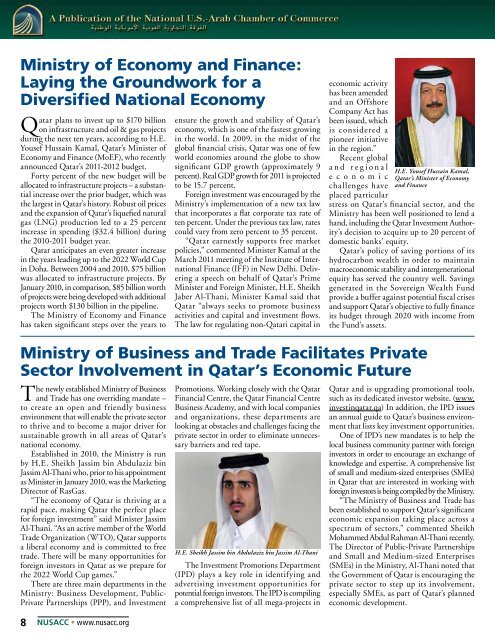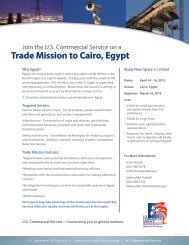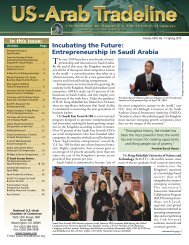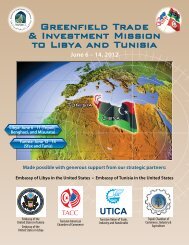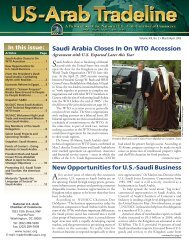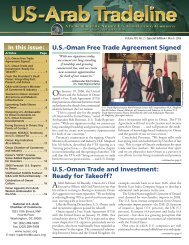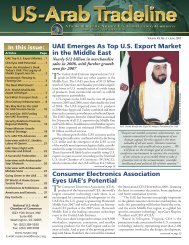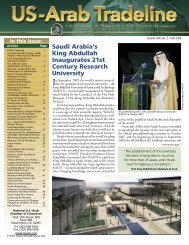Qatar - National US-Arab Chamber of Commerce
Qatar - National US-Arab Chamber of Commerce
Qatar - National US-Arab Chamber of Commerce
Create successful ePaper yourself
Turn your PDF publications into a flip-book with our unique Google optimized e-Paper software.
Ministry <strong>of</strong> Economy and Finance:<br />
Laying the Groundwork for a<br />
Diversified <strong>National</strong> Economy<br />
<strong>Qatar</strong> plans to invest up to $170 billion<br />
on infrastructure and oil & gas projects<br />
during the next ten years, according to H.E.<br />
Yousef Hussain Kamal, <strong>Qatar</strong>’s Minister <strong>of</strong><br />
Economy and Finance (MoEF), who recently<br />
announced <strong>Qatar</strong>’s 2011-2012 budget.<br />
Forty percent <strong>of</strong> the new budget will be<br />
allocated to infrastructure projects – a substantial<br />
increase over the prior budget, which was<br />
the largest in <strong>Qatar</strong>’s history. Robust oil prices<br />
and the expansion <strong>of</strong> <strong>Qatar</strong>’s liquefied natural<br />
gas (LNG) production led to a 25 percent<br />
increase in spending ($32.4 billion) during<br />
the 2010-2011 budget year.<br />
<strong>Qatar</strong> anticipates an even greater increase<br />
in the years leading up to the 2022 World Cup<br />
in Doha. Between 2004 and 2010, $75 billion<br />
was allocated to infrastructure projects. By<br />
January 2010, in comparison, $85 billion worth<br />
<strong>of</strong> projects were being developed with additional<br />
projects worth $130 billion in the pipeline.<br />
The Ministry <strong>of</strong> Economy and Finance<br />
has taken significant steps over the years to<br />
ensure the growth and stability <strong>of</strong> <strong>Qatar</strong>’s<br />
economy, which is one <strong>of</strong> the fastest growing<br />
in the world. In 2009, in the midst <strong>of</strong> the<br />
global financial crisis, <strong>Qatar</strong> was one <strong>of</strong> few<br />
world economies around the globe to show<br />
significant GDP growth (approximately 9<br />
percent). Real GDP growth for 2011 is projected<br />
to be 15.7 percent.<br />
Foreign investment was encouraged by the<br />
Ministry’s implementation <strong>of</strong> a new tax law<br />
that incorporates a flat corporate tax rate <strong>of</strong><br />
ten percent. Under the previous tax law, rates<br />
could vary from zero percent to 35 percent.<br />
“<strong>Qatar</strong> earnestly supports free market<br />
policies,” commented Minister Kamal at the<br />
March 2011 meeting <strong>of</strong> the Institute <strong>of</strong> International<br />
Finance (IFF) in New Delhi. Delivering<br />
a speech on behalf <strong>of</strong> <strong>Qatar</strong>’s Prime<br />
Minister and Foreign Minister, H.E. Sheikh<br />
Jaber Al-Thani, Minister Kamal said that<br />
<strong>Qatar</strong> “always seeks to promote business<br />
activities and capital and investment flows.<br />
The law for regulating non-<strong>Qatar</strong>i capital in<br />
economic activity<br />
has been amended<br />
and an Offshore<br />
Company Act has<br />
been issued, which<br />
is considered a<br />
pioneer initiative<br />
in the region.”<br />
Recent global<br />
a n d r e g i o n a l<br />
e c o n o m i c<br />
challenges have<br />
placed particular<br />
H.E. Yousef Hussain Kamal,<br />
<strong>Qatar</strong>’s Minister <strong>of</strong> Economy<br />
and Finance<br />
stress on <strong>Qatar</strong>’s financial sector, and the<br />
Ministry has been well positioned to lend a<br />
hand, including the <strong>Qatar</strong> Investment Authority’s<br />
decision to acquire up to 20 percent <strong>of</strong><br />
domestic banks’ equity.<br />
<strong>Qatar</strong>’s policy <strong>of</strong> saving portions <strong>of</strong> its<br />
hydrocarbon wealth in order to maintain<br />
macroeconomic stability and intergenerational<br />
equity has served the country well. Savings<br />
generated in the Sovereign Wealth Fund<br />
provide a buffer against potential fiscal crises<br />
and support <strong>Qatar</strong>’s objective to fully finance<br />
its budget through 2020 with income from<br />
the Fund’s assets.<br />
Ministry <strong>of</strong> Business and Trade Facilitates Private<br />
Sector Involvement in <strong>Qatar</strong>’s Economic Future<br />
The newly established Ministry <strong>of</strong> Business<br />
and Trade has one overriding mandate –<br />
to create an open and friendly business<br />
environment that will enable the private sector<br />
to thrive and to become a major driver for<br />
sustainable growth in all areas <strong>of</strong> <strong>Qatar</strong>’s<br />
national economy.<br />
Established in 2010, the Ministry is run<br />
by H.E. Sheikh Jassim bin Abdulaziz bin<br />
Jassim Al-Thani who, prior to his appointment<br />
as Minister in January 2010, was the Marketing<br />
Director <strong>of</strong> RasGas.<br />
“The economy <strong>of</strong> <strong>Qatar</strong> is thriving at a<br />
rapid pace, making <strong>Qatar</strong> the perfect place<br />
for foreign investment” said Minister Jassim<br />
Al-Thani. “As an active member <strong>of</strong> the World<br />
Trade Organization (WTO), <strong>Qatar</strong> supports<br />
a liberal economy and is committed to free<br />
trade. There will be many opportunities for<br />
foreign investors in <strong>Qatar</strong> as we prepare for<br />
the 2022 World Cup games.”<br />
There are three main departments in the<br />
Ministry: Business Development, Public-<br />
Private Partnerships (PPP), and Investment<br />
8 N<strong>US</strong>ACC • www.nusacc.org<br />
Promotions. Working closely with the <strong>Qatar</strong><br />
Financial Centre, the <strong>Qatar</strong> Financial Centre<br />
Business Academy, and with local companies<br />
and organizations, these departments are<br />
looking at obstacles and challenges facing the<br />
private sector in order to eliminate unnecessary<br />
barriers and red tape.<br />
H.E. Sheikh Jassim bin Abdulaziz bin Jassim Al-Thani<br />
The Investment Promotions Department<br />
(IPD) plays a key role in identifying and<br />
advertising investment opportunities for<br />
potential foreign investors. The IPD is compiling<br />
a comprehensive list <strong>of</strong> all mega-projects in<br />
<strong>Qatar</strong> and is upgrading promotional tools,<br />
such as its dedicated investor website. (www.<br />
investinqatar.qa) In addition, the IPD issues<br />
an annual guide to <strong>Qatar</strong>’s business environment<br />
that lists key investment opportunities.<br />
One <strong>of</strong> IPD’s new mandates is to help the<br />
local business community partner with foreign<br />
investors in order to encourage an exchange <strong>of</strong><br />
knowledge and expertise. A comprehensive list<br />
<strong>of</strong> small and medium-sized enterprises (SMEs)<br />
in <strong>Qatar</strong> that are interested in working with<br />
foreign investors is being compiled by the Ministry.<br />
“The Ministry <strong>of</strong> Business and Trade has<br />
been established to support <strong>Qatar</strong>’s significant<br />
economic expansion taking place across a<br />
spectrum <strong>of</strong> sectors,” commented Sheikh<br />
Mohammed Abdul Rahman Al-Thani recently.<br />
The Director <strong>of</strong> Public-Private Partnerships<br />
and Small and Medium-sized Enterprises<br />
(SMEs) in the Ministry, Al-Thani noted that<br />
the Government <strong>of</strong> <strong>Qatar</strong> is encouraging the<br />
private sector to step up its involvement,<br />
especially SMEs, as part <strong>of</strong> <strong>Qatar</strong>’s planned<br />
economic development.


